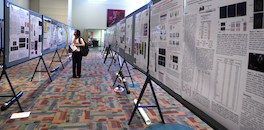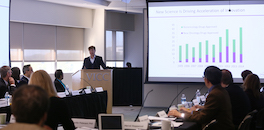RESEARCH THEMES
Members of the Genome Maintenance Program have expertise across all of the major processes involved in the faithful maintenance and expression of the genetic material:
Carcinogen Metabolism
How environmental agents and the products of natural cellular metabolism cause mutations and lead to cancer
Chromatin & Epigenetics
How the epigenome contributes to genome integrity and expression and how it goes awry in cancer
DNA Damage Response
How DNA damage response pathways are activated and how they function to maintain genome integrity and suppress cancer
DNA Metabolism
How DNA damage is repaired and how defects in these processes lead to cancer
Gene Expression
How control of gene expression is central to normal cellular homeostasis and cancer mechanisms
RESEARCH THEMES
The Gastrointestinal Cancer Program supports basic, translational and clinical research across all GI cancer types:
Causes of GI cancers
Determining the etiology and pathogenesis of gastrointestinal cancers
Diagnosis & Prediction
Developing biomarkers and imaging techniques to improve detection and predict efficacy of current and novel therapeutics for gastrointestinal cancers
Models of GI Cancer
Developing and studying novel laboratory models of cancer to improve understanding of human cancers
Translation Into Treatment
Translating laboratory discoveries into clinical investigations
RESEARCH THEMES
Investigators in the Cancer Epidemiology Research Program concentrate on four main themes:
Molecular & Genetic Epidemiology
Identifying genetic factors linked to cancer susceptibility
Nutrition & Lifestyle
Evaluating the impact of dietary, lifestyle, and environmental factors on cancer risk
Prognostic Factors
Identifying genetic and lifestyle factors that predict cancer survival and recurrence
Global Health
Understanding the differences in cancer risk and mortality in different populations
RESEARCH THEMES
The Cancer Health Outcomes and Control Program aims to achieve the goal of reducing the cancer burden through:
Prevention & Early Detection
Establishing and further developing population and community-based resources for research into prevention and early detection
Treatment-Related Outcomes
Identifying environmental, sociobehavioral and genetic factors that affect short- and long-term outcomes
Survivorship & Palliative Care
Understanding the scope of and developing interventions to prevent or ameliorate adverse long-term patient-centered outcomes following cancer diagnosis and treatment
Health Policy
Designing and testing healthcare practices and policies that improve access to and delivery of care to minimize the burden of cancer
Membership Resources
Becoming a VICC Member
Criteria for Membership
Membership is open to faculty of Vanderbilt University, Vanderbilt University Medical Center, Meharry Medical College and Tennessee State University who meet the following requirements:
Membership Information
Membership in the Vanderbilt-Ingram Cancer Center provides new opportunities for interactions and collaborations with our outstanding cancer researchers and physician scientists.
Funding Sources
| Source | Eligibility | Funding Cycle | Amount | Principal Investigator |
|---|---|---|---|---|
| Multi-Tier Developmental Research Funding | Vanderbilt-Ingram Cancer Center members only | Variable | Three Tiers | Ben Ho Park, M.D., Ph.D. |
Funding Opportunities
Vanderbilt-Ingram Cancer Center regularly solicits applications for pilot funding to support basic, translational, clinical or collaborative cancer research. Pilot funds allow investigators to collect preliminary data to support an application for independent research support through extramural, peer-reviewed funding. Over the past five years, the Cancer Center awarded $4.1 million to fund 98 pilot projects. This investment led to the acquisition of more than $41 million in extramurally funded grants – a 985 percent return on investment.








